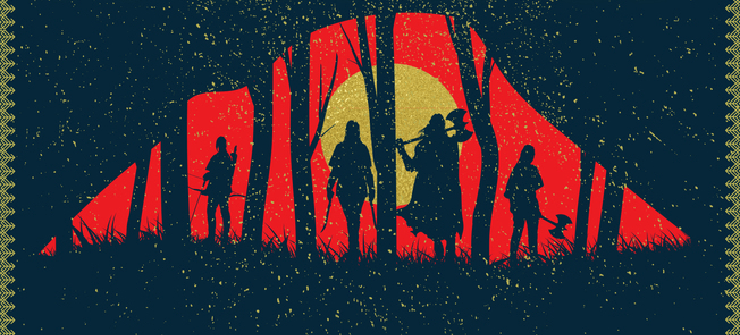It’s scary to grow up girl in this world of ours. The constant pressure to maintain a certain standard of beauty, fear of harassment, and the insidious effects of rape culture—as well as consistent dismissal, ridicule, and cruelty directed at women by those in power—mean that we are constantly struggling to make our voices heard and be taken seriously.
This is even more of a predicament for girls and teens. The things they’re passionate about are met with eyerolls. They’re scorned as silly, superficial, and vain, even as they are told, directly and indirectly, through countless advertisements and media, that they are worth only as much as their beauty. I have experienced this struggle in my own life—both when I was a teen and also now that I’m a grown woman. If you’re too ambitious, you’re a bitch. If you’re too nice, you’re reviled as weak, and subsequently preyed upon or taken advantage of.
It’s a fine line of contradicting standards that every girl must figure out how to navigate, and one that I still haven’t quite figured out how to walk. If I send an email that doesn’t emote enough, that is too brusque, will I be labeled “unlikeable”? If I request fair payment for my work, will I be considered a diva and blacklisted? Passed over in favor of others? Even though surely no man would hesitate to make such demands.
Because this is such an ongoing topic of interest in my own life, both personally and professionally, I am drawn to books that feature that horrible, overused phrase “unlikeable female protagonists.” Aren’t we in fact simply talking about complex, flawed, human characters? Characters that are often unfairly derided because of their gender—and because of the expectations for that gender that a wildly patriarchal society has foisted upon us?
Why are certain traits more acceptable in male characters than they are in female characters? Anger, lust, selfishness, ambition, arrogance, unpredictability, viciousness. These traits have been par for the course in beloved male characters for ages; but, in female characters, they are decried.
This is why I love the following books, all of which are fantasy novels (my genre of choice), all of which feature girls and young women who don’t much care if they’re “likeable” or not.
The Golden Compass by Philip Pullman
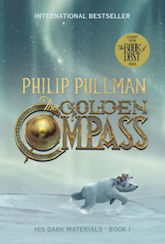 I recently re-read Pullman’s incredible His Dark Materials trilogy in preparation for tackling his “-equel,” The Book of Dust. Besides the phenomenal world building, the thing that struck me most during this second read—years after first devouring the trilogy when I was younger—was the character of Lyra Belacqua. The protagonist of Pullman’s opus, Lyra is an excellent liar. She’s brave, yes, but also rash, rude, and sometimes selfish. She’s wild and ferocious in a way that borders on feral. Unabashedly emotional, desperate for affection from her fearsome uncle Lord Asriel, entranced by the beautiful and mysterious Mrs. Coulter, Lyra is subject to the same whims as the rest of us—whims that certainly governed my passions as a girl. I love that she doesn’t apologize for who she is, and that it’s the very things that make her “unlikeable” (i.e., her complexities, her deeply human flaws) that help her change the world.
I recently re-read Pullman’s incredible His Dark Materials trilogy in preparation for tackling his “-equel,” The Book of Dust. Besides the phenomenal world building, the thing that struck me most during this second read—years after first devouring the trilogy when I was younger—was the character of Lyra Belacqua. The protagonist of Pullman’s opus, Lyra is an excellent liar. She’s brave, yes, but also rash, rude, and sometimes selfish. She’s wild and ferocious in a way that borders on feral. Unabashedly emotional, desperate for affection from her fearsome uncle Lord Asriel, entranced by the beautiful and mysterious Mrs. Coulter, Lyra is subject to the same whims as the rest of us—whims that certainly governed my passions as a girl. I love that she doesn’t apologize for who she is, and that it’s the very things that make her “unlikeable” (i.e., her complexities, her deeply human flaws) that help her change the world.
The Hazel Wood by Melissa Albert
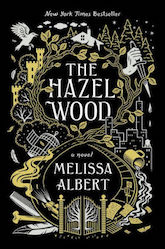 Albert’s exquisitely written debut is a portal fantasy, which is one of my favorite subgenres, and tells the story of Alice Proserpine, granddaughter of a famous, reclusive author of fairy tales. For as long as she can remember, horrible luck has followed Alice and her mother. When Alice’s mother is taken, Alice makes the journey to find her and discovers secrets about her own past, and her grandmother’s. Alice is one of the angriest young adult protagonists I’ve ever encountered, and I love her for it. She’s self-aware enough to recognize when she’s saying or doing something horrible, and yet she can’t stop herself. She’s cynical and sometimes treats her loved ones with scorn or disdain, or is outright manipulative. But there is so much humanity in her, so much bravery and intelligence and love. Her complexity fascinates me even as it frustrates me, and makes for a much more interesting reading experience than would the story of a perfectly affable audience surrogate.
Albert’s exquisitely written debut is a portal fantasy, which is one of my favorite subgenres, and tells the story of Alice Proserpine, granddaughter of a famous, reclusive author of fairy tales. For as long as she can remember, horrible luck has followed Alice and her mother. When Alice’s mother is taken, Alice makes the journey to find her and discovers secrets about her own past, and her grandmother’s. Alice is one of the angriest young adult protagonists I’ve ever encountered, and I love her for it. She’s self-aware enough to recognize when she’s saying or doing something horrible, and yet she can’t stop herself. She’s cynical and sometimes treats her loved ones with scorn or disdain, or is outright manipulative. But there is so much humanity in her, so much bravery and intelligence and love. Her complexity fascinates me even as it frustrates me, and makes for a much more interesting reading experience than would the story of a perfectly affable audience surrogate.
Dread Nation by Justina Ireland
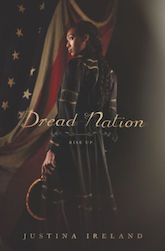 Ireland’s brilliantly conceived Dread Nation takes place in an alternate history Reconstruction era plagued by the walking undead, in which black children are forced to attend schools where they are trained to become zombie hunters. It’s a spectacular concept, reinforced by Ireland’s brisk, action-packed writing. One of the most enjoyable aspects of the novel for me was Jane McKeene, our zombie-slaying protagonist. Jane is smart, an excellent liar, strong, and capable. She literally slays zombies. With sickles. (Have I mentioned how just plain cool this book is?) She’s also angry. She recognizes the injustices of the racist world she lives in, and is fully aware of the way people in her society perceive her. Despite this, she is not immune to passing judgments herself—such as resenting her enemy-turned-friend Kate, who is black but with light enough skin that she “passes” as white. Kate’s appearance is also more aligned with what their society considers “feminine.” It’s understandable, then, that Jane would resent Kate, given the cruelty with which Jane is treated by those in power. It’s a dynamic that Ireland shrewdly explores, leading to a beautiful friendship between Jane and Kate that ended up being my favorite element of the book.
Ireland’s brilliantly conceived Dread Nation takes place in an alternate history Reconstruction era plagued by the walking undead, in which black children are forced to attend schools where they are trained to become zombie hunters. It’s a spectacular concept, reinforced by Ireland’s brisk, action-packed writing. One of the most enjoyable aspects of the novel for me was Jane McKeene, our zombie-slaying protagonist. Jane is smart, an excellent liar, strong, and capable. She literally slays zombies. With sickles. (Have I mentioned how just plain cool this book is?) She’s also angry. She recognizes the injustices of the racist world she lives in, and is fully aware of the way people in her society perceive her. Despite this, she is not immune to passing judgments herself—such as resenting her enemy-turned-friend Kate, who is black but with light enough skin that she “passes” as white. Kate’s appearance is also more aligned with what their society considers “feminine.” It’s understandable, then, that Jane would resent Kate, given the cruelty with which Jane is treated by those in power. It’s a dynamic that Ireland shrewdly explores, leading to a beautiful friendship between Jane and Kate that ended up being my favorite element of the book.
Incarceron by Catherine Fisher
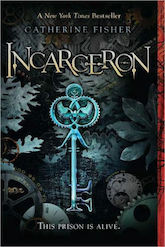 Catherine Fisher’s duology of Incarceron and its sequel, Sapphique, about a vast, sentient prison, were instant favorites when I read them years ago. Like His Dark Materials, this is a series distinguished by its phenomenal world building, as well as its precisely elegant prose and complex characters. My favorite of the two primary protagonists, Claudia, is daughter of the Incarceron Warden, and has lived a life of privilege and luxury. While trying to avoid an arranged marriage, Claudia begins to discover Incarceron’s secrets, while Incarceron itself strives to outwit her. Claudia is intelligent and strong-willed, but she is also spoiled thanks to her upbringing and doesn’t always acknowledge her privilege, even as she works to dismantle the system that allowed her that privilege. She is also blinded by a fiercely protective love for her tutor and a thirst for the love of her cold, calculating father. With this love comes an occasional selfishness that keeps Claudia oblivious to the needs and fears of others, often making her seem as cold as the father she fears. I adore these complexities and contradictions. I don’t remember much of the other, more “likable” protagonist, Finn. It’s complex, prickly Claudia whom I often find myself thinking about, years later.
Catherine Fisher’s duology of Incarceron and its sequel, Sapphique, about a vast, sentient prison, were instant favorites when I read them years ago. Like His Dark Materials, this is a series distinguished by its phenomenal world building, as well as its precisely elegant prose and complex characters. My favorite of the two primary protagonists, Claudia, is daughter of the Incarceron Warden, and has lived a life of privilege and luxury. While trying to avoid an arranged marriage, Claudia begins to discover Incarceron’s secrets, while Incarceron itself strives to outwit her. Claudia is intelligent and strong-willed, but she is also spoiled thanks to her upbringing and doesn’t always acknowledge her privilege, even as she works to dismantle the system that allowed her that privilege. She is also blinded by a fiercely protective love for her tutor and a thirst for the love of her cold, calculating father. With this love comes an occasional selfishness that keeps Claudia oblivious to the needs and fears of others, often making her seem as cold as the father she fears. I adore these complexities and contradictions. I don’t remember much of the other, more “likable” protagonist, Finn. It’s complex, prickly Claudia whom I often find myself thinking about, years later.
The Boneless Mercies by April Genevieve Tucholke
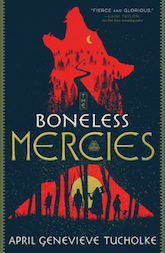 Tucholke is one of my favorite young adult authors, her books characterized by immaculately crafted atmosphere and prose so decadent you’re compelled to read it aloud to savor the sensation of the language on your tongue. Her latest, The Boneless Mercies (out October 2), is her best work yet. Inspired by Beowulf, this dark fantasy stars four girls—Frey, Ovie, Juniper, and Runa—who are hired to carry out mercy killings. But these girls dream of a better life, so when Frey hears about a terrible monster terrorizing a nearby kingdom, the Mercies see an opportunity: Slay the beast. Reap the rewards. Become legends. Like all Tucholke’s works, The Boneless Mercies is beautifully written and features four bloodthirsty girls who are willing to stop at nothing in their quest to reclaim ownership of their own lives. They are unapologetic in their viciousness, and immersing myself in their story—especially in this fraught era of #MeToo and uncertainty about the future—was cathartic, comforting, and empowering.
Tucholke is one of my favorite young adult authors, her books characterized by immaculately crafted atmosphere and prose so decadent you’re compelled to read it aloud to savor the sensation of the language on your tongue. Her latest, The Boneless Mercies (out October 2), is her best work yet. Inspired by Beowulf, this dark fantasy stars four girls—Frey, Ovie, Juniper, and Runa—who are hired to carry out mercy killings. But these girls dream of a better life, so when Frey hears about a terrible monster terrorizing a nearby kingdom, the Mercies see an opportunity: Slay the beast. Reap the rewards. Become legends. Like all Tucholke’s works, The Boneless Mercies is beautifully written and features four bloodthirsty girls who are willing to stop at nothing in their quest to reclaim ownership of their own lives. They are unapologetic in their viciousness, and immersing myself in their story—especially in this fraught era of #MeToo and uncertainty about the future—was cathartic, comforting, and empowering.
 Claire Legrand is the New York Times-bestselling author of Furyborn, the first book in the Empirium Trilogy. She is also the author of several other titles for children and teens, most notably The Cavendish Home for Boys and Girls, Winterspell, and the Edgar Award-nominated Some Kind of Happiness. Sawkill Girls is her seventh novel. Claire lives in central New Jersey, where she works as a librarian.
Claire Legrand is the New York Times-bestselling author of Furyborn, the first book in the Empirium Trilogy. She is also the author of several other titles for children and teens, most notably The Cavendish Home for Boys and Girls, Winterspell, and the Edgar Award-nominated Some Kind of Happiness. Sawkill Girls is her seventh novel. Claire lives in central New Jersey, where she works as a librarian.










